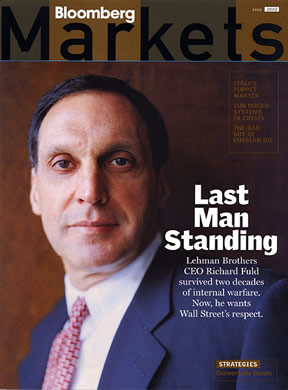First, I think Ben should probably get the Medal of Freedom, when this is all over. He's certainly seems more on the job than Bush's CIA lacky, who got the award, at least...
Anyway, here's a stab at the spin going on to "get action" this week on a barely vetted or thought-through plan:
"First, banks will have a basis for valuing those assets and will not have to use fire sale prices.
Banks already have a basis for hold-to-maturity prices.
If the FED wants a public price, they can simply hire some valuation specialists and publish the prices they think are "right".
Just do it now: tell me the peak foreclosure rate, the time it will occur, and the peak-to-trough price fall overall for home prices... We can use those to determine a "hold-to-maturity" price.
Their capital will not be unreasonably marked down. The accountants can be made to accept the FED's marks, if that is all he's after, right?
Afterall, the bids in a reverse auction with the Treasury will represent nothing more than where the Treasury Secretary chooses to mark his own book, right?
Second, liquidity should begin to come back to these markets. Liquidity will not come back until there are willing buyers.
No one but the Fed/Treasury, right now, has the capital/capacity or willingness to buy up sub-prime assets.
The only way to get liquidity back immediately is to provide a backstop, as was done with the Brady plan in the 80s.
As long as the housing market is in a down spin, no one will bid these securities and, what's more, and no one will accept a credit-agency's rating of them. (Remember also that the rating on this stuff doesn't change because the price at which it is purchased is favorable - it's still rated junk).
Third, removal of these assets from balance sheets and better information on value should reduce uncertainty and allow the banks to attract new private capital.That's true, but there is *more than one way* to do that. The Paulson plan is not the only one.
Fourth, credit markets should start to unfreeze. New credit will become available to support our economy. True, but again, there are alternative plans that will do the same thing. Paulson's "plan" is not the only one.
And fifth, taxpayers should own assets at prices close to the hold-to-maturity values, which minimizes their risk.No, the taxpayers should pay for a "bailout" using the power of the treasury to backstop at current interest rates (and get paid back for taking risks).
What's more, with the Bush-Paulson's "plan", the government remains out of control on important variables.
For one, there is no indication that the Treasury can hold an auction for one institution only. Thus, if you have a LOT of junk, then you are the LAST one completely satisfied, potentially (at least if the auction terms are fair).
There is still no way to give a capital infusion directly to AIG, for instance, unless the government gets involved in buying up derivatives.
Devoid of an implicit guarantee from the Treasury (a reverse-auction bid is not a guarantee), this plan "hopes" that the cleaned-up balance sheets will be enough to hold back the problems with CDS. As such, it does NOT address "root causes". It doesn't anticipate or plan for further deterioration of the mortgage markets, including in prime loans ...
Getting the Treasury involved in managing a giant portfolio of complex assets is ... crazy! They should stick to one kind of simple security, sub-prime and alt-a mortgages, to start!
If default rates continue to soar, then the Treasury is on the hook for the full amount of the price and distressed decline. In another plan, one that deals mainly with foreclosures and helping homeowners, the taxpayers can share those upcoming loses with the lenders, rather than absorb the entire risk of the market ...
[+/-] Show Full Post...
[+/-] Hide Full Post...
















